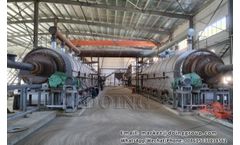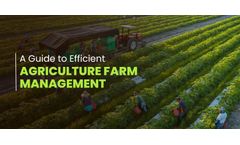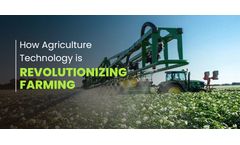Refine by
Maximizing Crop Yield Articles & Analysis: Older
163 articles found
Sustainable agriculture is increasingly recognized as a critical component in addressing the global challenges of climate change, food security, and environmental degradation. One innovative solution gaining traction in this field is the biochar machine, which plays a pivotal role in producing biochar — a stable form of carbon made from organic materials. Biochar’s properties make it ...
Plant hormones, also known as phytohormones, are trace organic compounds synthesized within plants that play a crucial role in regulating various aspects of growth and development. These hormones are produced in specific tissues and can be transported to different parts of the plant, where they exert their effects at remarkably low concentrations. Their influence spans a wide array of processes, ...
Liposomes are structural entities composed of a lipid bilayer surrounding an aqueous solution. Their distinctive characteristics have led to numerous applications in diverse scientific and technological domains. In the realm of agricultural chemicals, liposomes can be utilized to augment the effectiveness of pesticides and facilitate the delivery of essential nutrients. Several studies have shown ...
Biochar is a carbon-rich material produced through the pyrolysis of organic biomass under low oxygen conditions. Common feedstocks include agricultural waste, forestry residues, and even municipal organic waste. Its porous structure and chemical properties make it highly effective for soil improvement and environmental benefits. Agricultural practices in developing countries often face hurdles ...
In today’s highly regulated industries like food and beverage storage and agriculture, maintaining optimal humidity control is critical to ensuring product quality, extending shelf life, and maximizing operational efficiency. The Industrial Applications of Membrane Humidifier – Food and Beverage Storage, Agriculture and Vertical Farming Industry rely heavily on precise humidification ...
The irrigation process in agriculture, landscaping, and water management is crucial in its work with climate change-altered efficiency and sustainability. When the global temperature increases, so does the irregular supply of water, which directly affects irrigation systems across different parts of the globe. We pick from here and discuss further how climate change impacts irrigation and the ...
Biochar, a carbon-rich byproduct derived from the thermal decomposition of organic materials, is gaining attention for its environmental and agronomic benefits. Derived from agricultural waste biomass, biochar not only provides a sustainable way to manage waste but also serves as an effective soil amendment, enhancing soil fertility and sequestering carbon. Understanding how biochar is made and ...
(pigweeds) has been well-documented. Crop Versatility: Pyroxasulfone is applicable in various cropping systems, including cereals, soybeans, corn, and legumes. ...
Water plays a critical role in agriculture, serving as the lifeblood for crops and soil, and is essential for growing food. However, natural rainfall is often unpredictable, insufficient, or unevenly distributed across regions, making irrigation systems a vital component of modern farming. With effective irrigation, many farmers would be able to produce enough crops to meet both local and global ...
In recent years, corn cob charcoal making technology has become popular. After carbonization, corn cobs are converted into a high-quality biomass carbon. This biomass carbon not only has the characteristics of high calorific value and low pollution, but also has a wide range of application prospects. And the carbonization process of corn cobs is simple and efficient. Just place the corn cobs on ...
(pigweeds) has been well-documented. Crop Versatility: Pyroxasulfone is applicable in various cropping systems, including cereals, soybeans, corn, and legumes. ...
Modern agriculture faces numerous challenges, such as the ever-increasing population, development of biomass-derived feedstocks for greener industries, developing in a sustainable and rapid manner, the major climate change. All of them pose a major threat to global food and energy security. Synthetic biology can provide tools to address many of these challenges and the industry is likely to be a ...
Agriculture has always been a fundamental part of human civilization, providing the food and resources necessary for survival. However, as the global population continues to rise and climate change presents new challenges, the need for efficient agriculture farm management has become increasingly critical. Implementing modern technologies and innovative practices can help optimize productivity, ...
Precision agriculture is a revolutionary approach that leverages technology to optimize farming practices. Precision agriculture systems offer a modern solution to these age-old problems, enabling farms to enhance productivity, reduce waste, and improve sustainability. ...
Kamala Farms is a leading name in hydroponic farming in India, and faced its own set of challenges in scaling operations and managing its network of client’s farms. By adopting KhetiBuddy’s farm management solution, Kamala Farms transformed its business process and consulting practices, optimizing its processes and driving significant improvements. Kamala Farms initially struggled ...
Modern agriculture faces numerous challenges, such as the ever-increasing population, development of biomass-derived feedstocks for greener industries, developing in a sustainable and rapid manner, the major climate change. All of them pose a major threat to global food and energy security. Synthetic biology can provide tools to address many of these challenges and the industry is likely to be a ...
As global awareness of environmental issues continues to rise, the demand for sustainable waste management solutions is more pressing than ever. In recent years, the push for sustainable practices has brought composting to the forefront of waste management solutions. Composting, the process of decomposing food waste into nutrient-rich soil, has traditionally been a slow, labor-intensive ...
The agricultural sector is at a critical stage. With the global population projected to reach nearly 10 billion by 2050, the demand for food is increasing rampantly. At the same time, there is mounting pressure to adopt sustainable farming practices to protect our planet’s limited resources. This delicate balance between increasing food production and minimizing environmental impact ...
For generations, farmers have relied on chemical fertilizers to boost crop yields. However, these fertilizers come with a hidden cost: environmental damage. Here's where biochar steps in as a game-changer for sustainable agriculture.What is Biochar?Biochar is a charcoal-like substance created by heating organic materials like wood chips or crop residue in an oxygen-limited environment. This ...
Traditional farming methods, once sufficient, are now struggling to meet the demands of modern food production. New-age techniques in crop management provide innovative methods and technologies designed to maximize crop yield, enhance sustainability, and ensure food security for future ...












